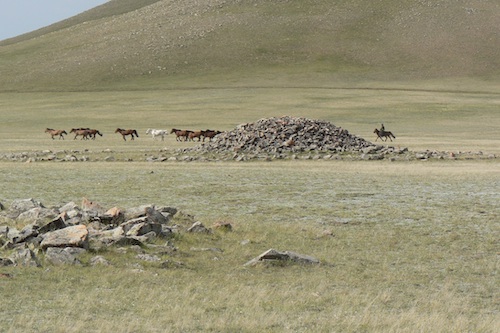Department of Folk Studies and Anthropology News
WKU Archaeologist Partners with Max Planck Institute
- Friday, February 11th, 2022

Dr. Jean-Luc Houle, associate professor of anthropology in the WKU Department of Folk Studies and Anthropology, is partnering with scholars of the Max Planck Institute for the Science of Human History in Germany to study the initial dispersals of domesticated livestock across Central and Inner Asia beginning about 5,000 years ago. Other collaborators are affiliated with the National Museum of Mongolia.
(photo) A herder drives horses near ancient stone burial mounds on the Mongolian steppe.
Domesticated sheep, goats, and cattle were essential to the economies of mobile herding communities who lived on the expansive Asian steppe as early as the Bronze Age. Not only were meat and milk key elements of the diet, but hides, wool, and bones were utilized for tools, housing, and other purposes. Today, nomadic pastoralism continues as the predominant lifeway in this region.
The multi-year collaborative research projects involve radiocarbon dating and analysis of genetic material from the bones and teeth of domesticated sheep, goats, and cattle from archaeological sites in Mongolia and bordering countries where Dr. Houle and other archaeologists have worked for several decades. These data can indicate when and where the animal species were domesticated, and when and where the domesticated livestock spread into other areas. The researchers also are interested in how the genetic makeup of livestock populations changed over time and the evolutionary processes involved, as well as the genomics of pathogens associated with the domesticated animals.
The Max Planck Institute for the Science of Human History (MPI-SHH) in Jena, Germany was founded in 2014 to target fundamental questions of human history and evolution over the last several million years. It currently consists of three interdisciplinary research departments that integrate methods and research questions from the natural sciences and the humanities: the Department of Archaeology, the Department of Archaeogenetics, and the Department of Linguistic and Cultural Evolution. Affiliates of the MPI-SHH explore big questions of the human past, such as the history of human global migrations, human modifications of ecosystems, and the impacts of environmental change on humans. MPI-SHH is one of 86 institutes of the Max Planck Society for the Advancement of Science, an independent, non-profit research organization founded in 1948 as a successor to the Kaiser Wilhelm Society, established in 1911.
The National Museum of Mongolia (NMM) preserves and promotes the rich cultural heritage of a nomadic lifestyle as experienced for millennia by Mongolia’s ancestors, who left an indelible mark on Mongolia and on world history. Through collections presented in nine permanent exhibit halls and virtual tours and experiences, the museum connects past and present to provide a memorable, informative, and inspiring journey through Mongolia.
To learn more about Dr. Houle's research, visit https://westernmongoliaarchaeology.weebly.com.
Some of the links on this page may require additional software to view.

